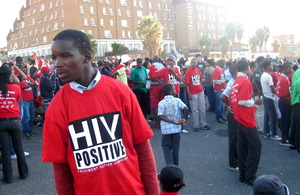DFID Research: Activism and aid combine to fight HIV/AIDS in South Africa
Activists and health workers combine to mobilise people living with HIV and AIDS and to provide the medicine and care that patients need

March for Resources for Health. Picture: Poppy Riddle, TAC
The Treatment Action Campaign (TAC), South Africa’s most influential AIDS advocacy group, recently joined up with Medecins Sans Frontieres (MSF, or Doctors Without Borders). Together, the organisations began dispatching activists and health workers to both mobilise people living with HIV and AIDS and to provide the medicine and care that patients need.
Research supported by the Department for International Development is helping the organisations to document and understand this blending of activism and aid in South Africa. The work - one of a series of projects coordinated by the Development Research Centre on Citizenship, Participation and Accountability - has the potential to establish a new, more holistic model for providing treatment, while also combating the social stigma suffered by people living with HIV and AIDs in South Africa.
The politics of HIV and AIDS in South Africa, especially the dissident views of public figures, was driven by a strong distrust of the scientific establishment and a desire to use ‘indigenous knowledge’ and ‘African solutions’ to confront the problem. The public discourse, unfortunately, legitimised many of the popularly held AIDS ‘myths’ and contributed to the stigma and shame associated with the disease. This has led to a defensive posture and widespread denial about AIDS among the general public.
How TAC battles the stigma of AIDS
When TAC activists accompanied workers from MSF on a visit to a small village in the Eastern Cape Province, the headman’s wife told them they could not possibly carry out their work in the area because none of the residents would admit to having HIV/AIDS. She was staggered to be informed that most of the visiting group were themselves living with HIV/AIDS, and that residents need not feel ashamed. TAC and MSF have since attracted attention for the rapid advances they have made in the provision of anti-retroviral treatment in the area, though the project continues to face entrenched forms of stigma, denial and rampant AIDS myths.
TAC battles these challenges by encouraging HIV positive people to be knowledgeable and empowered about their condition: to be, in effect, patient-activists. People who may have been very close to death may seek biomedical treatment of opportunistic infections, join a TAC support group and enrol for anti-retroviral treatment with MSF. The patient-activist learns basic scientific knowledge about HIV and AIDS, including its symptoms and anti-retroviral treatment and will have to wait to find out if the drugs will work. Recruitment into TAC allows them access to a supportive community and non-hierarchical social space. While there is no guarantee, these processes can transform a stigmatised and dying patient into an activist-citizen empowered with knowledge about HIV and AIDS and an ability to speak out in public spaces.
“When I go to my doctor I tell him exactly what medicines I need,” said one woman living with AIDS. “He asks me if I’ve trained in medicine at the university. No, I say to him. It was TAC that taught me.”
More Information
See R4D document record: Mobilising and Mediating Global Medicine and Health Citizenship: The Politics of AIDS Knowledge Production in Rural South Africa. IDS Working Paper No. 324.